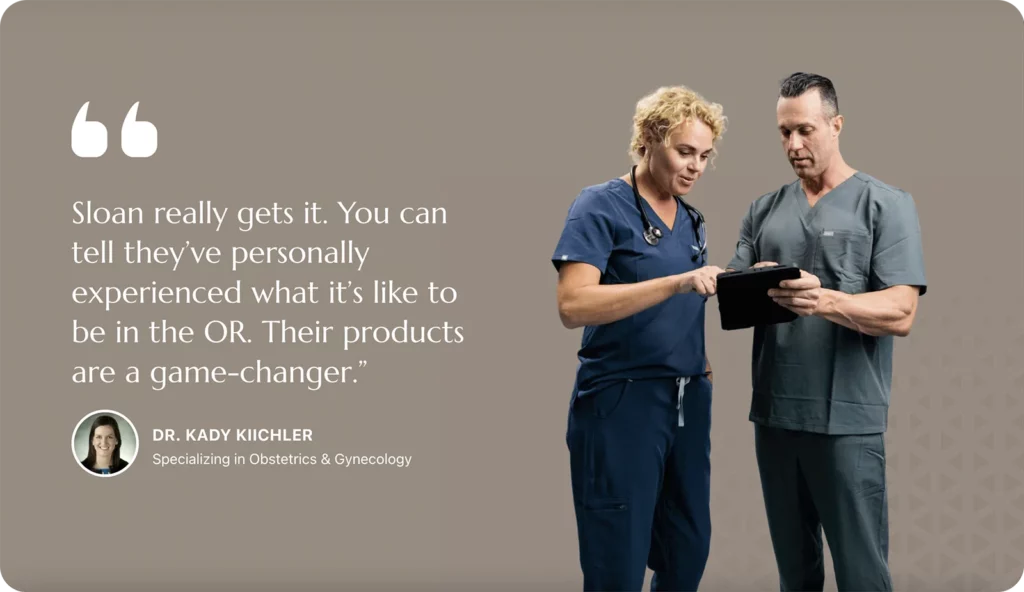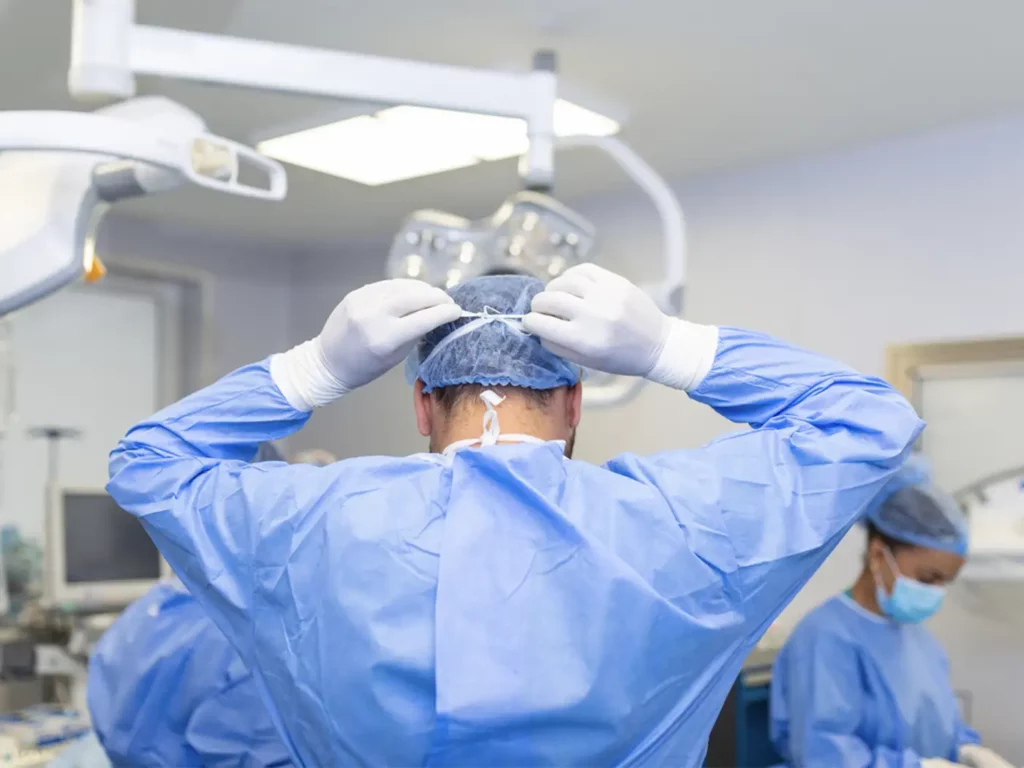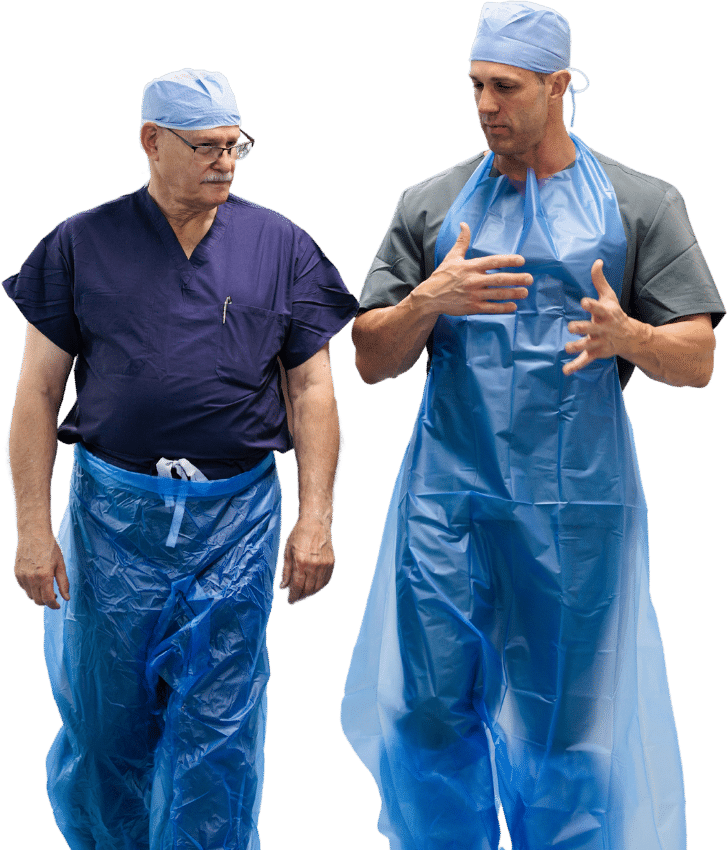Surgeons have a world of options when choosing the PPE and disposable medical clothing they rely on to keep them safe from bodily fluids, bloodborne pathogens, and illness.
Based on 30 years of experience protecting healthcare staff, with the added expertise of our founder, Urologist Dr. Stewart Sloan, this is the Ultimate Guide to Operating Room PPE for Surgeons!
Keep staff safe from the biggest health threats in the OR
In the operating room (OR), the safety of you and your staff is of utmost importance. With the potential exposure to various health threats, it is crucial to take proactive measures to ensure the well-being of everyone involved. These are the biggest health threats in the OR:
Infections
Healthcare-acquired infections (HAIs), also known as nosocomial infections, are infections that occur while receiving or providing medical care in healthcare facilities. These infections pose a significant risk to patients, as they can result in prolonged hospital stays, increased morbidity and mortality rates, and increased healthcare costs.
Airborne & Bloodborne Contaminants
Airborne and bloodborne contaminants pose significant risks in various environments, including healthcare facilities, laboratories, and industrial settings. These contaminants can lead to infections and diseases, making it crucial to address them effectively. Disposable personal protective equipment (PPE) products offer a practical solution in mitigating these risks.
Cross-Contamination
Did you know that cross-contamination is one of the leading causes of HAIs? It accounts for an estimated 40% of all such infections. Cross-contamination occurs when bacteria or other microorganisms are transferred from one person to another, or from one object to another. This can happen through direct contact, or indirectly through contaminated surfaces or objects.
Ergonomic Injury
Ergonomic injuries are a significant concern in the healthcare industry, particularly among nursing assistants. According to the United States Department of Labor, musculoskeletal disorders were reported as the most common injuries experienced by nursing assistants in 2020.
Operating room staff often perform physically demanding tasks, such as lifting patients, maintaining awkward positions, and operating heavy equipment. These activities can lead to musculoskeletal injuries, including back pain, neck strain, and repetitive strain injuries. Training in body mechanics, ergonomic equipment, and regular breaks can make operating rooms safer for your staff.
Discover the ways to keep your staff safe from these dangers. Click here to keep reading.
The Top 5 Healthcare-Acquired Infections in Patients and How to Prevent Them
Healthcare-acquired infections are a significant concern in hospitals and healthcare facilities, posing a threat to patient safety. These infections can lead to prolonged hospital stays, increased healthcare costs, and potential harm to patients. However, by implementing effective prevention measures, we can minimize the risk of HAIs.
CAUTIs
Preventing Catheter-Associated Urinary Tract Infections (CAUTIs) requires implementing various measures and strategies. Proper insertion and maintenance of urinary catheters, avoiding unnecessary usage, and promoting early removal are crucial steps in addressing this healthcare-associated infection.
CLABSIs
Prevention strategies for central line-associated bloodstream infections (CLABSIs) are essential to ensure patient safety and improve healthcare outcomes. Following strict infection prevention protocols during central line insertion and maintenance is crucial in reducing the incidence of CLABSIs.
SSIs
Surgical Site Infections (SSIs) are a serious concern in the healthcare industry, as they can lead to complications and prolonged hospital stays for patients. Sterile instruments, cleanliness and air control in the operating room, appropriate surgical drapes and gowns, prophylactic antibiotics, and proper hand hygiene all play a critical role in preventing SSIs and ensuring patient safety.
VAP
Ventilator-associated pneumonia (VAP) is a serious complication that can occur in patients on mechanical ventilation. Adhering to aseptic techniques, maintaining proper hand hygiene, elevating the head of the bed, and promoting early weaning from the ventilator are essential steps in ensuring patient safety.
C. diff
C. diff, short for Clostridium difficile, is a type of bacteria that causes gastrointestinal disease. This infection is commonly found in healthcare settings, affecting individuals who have taken antibiotics.
Symptoms of a C. diff infection include diarrhea, fever, and abdominal pain. In severe cases, it can lead to colitis or inflammation of the colon. It is crucial to identify and treat this infection promptly to prevent complications.
By practicing proper prevention measures, such as hand hygiene and appropriate use of antibiotics, we can mitigate the impact of C. diff and promote better care for infected individuals.
Protecting Yourself from Blood and Bodily Fluid Splashes
In the healthcare and medical fields, potential exposure to blood and bodily fluids is a constant concern. Protecting oneself from splashes that may contain pathogens or infectious materials is key to preventing the spread of diseases and promoting a safe working environment. By following proper safety protocols and utilizing personal protective equipment (PPE), healthcare professionals can effectively shield themselves from potential risks. Let’s take a look at ways to protect oneself from blood and bodily fluid splashes, ensuring the well-being of both medical personnel and patients.
What to Cover
When it comes to operating rooms, almost every surface you can think of is at high risk of catching blood or fluid spatter. These surfaces include the hands, eyes, face, hair, and shoes of surgeons and staff working in the operating room.
To protect these surfaces from blood spatter, healthcare professionals need to take necessary precautions. Wearing gloves and gowns can help protect their hands and body from getting in direct contact with blood. Eye protection, such as goggles or face shields, can prevent blood from reaching their eyes. Wearing surgical masks can help protect their face and mouth from potential splashes. Additionally, covering their hair with surgical caps and wearing shoe covers can prevent blood from contaminating their hair and shoes.
How to Cover
Cover Shoes and Pants with Slip-On Shoe Covers & Knee Highs
The right slip-on shoe covers are made from an impervious 2 ml polyethylene blend, which provides excellent protection against liquids and substances. Here is a step-by-step guide on how to cover your shoes with these slip-on shoe covers:
- Prepare your slip-on shoe covers: Ensure that you have the slip-on shoe covers ready and easily accessible. This will make the process smoother and quicker.
- Hold the slip-on shoe cover by the opening: Take one slip-on shoe cover in your hand and hold it by the opening. Make sure the shoe cover is facing the correct way, with the impervious polyethylene blend on the outside.
- Slide your foot into the shoe cover: With your shoe on, slide your foot into the opening of the slip-on shoe cover. Ensure that your entire shoe is covered by the slip-on shoe cover.
- Adjust the shoe cover: Once your shoe is covered, adjust the slip-on shoe cover to ensure a snug fit. Pay attention to the heat-sealed seams that prevent leaking, making sure they align properly with your shoe.
- Repeat for the other shoe: Repeat the process for the other shoe to fully cover both your feet.
The best slip-on shoe covers are designed to be one-size-fits-all, allowing for easy wearing under surgical gowns. Choose options made from an impervious polyethylene blend and heat-sealed seams provide reliable protection and prevent any leakage.
Other Precautions to Take
The Centers for Disease Control and Prevention (CDC) recommends a set of standard precautions that should be taken when handling any bodily fluid, such as blood, urine, vomit, and feces. The three main ways to prevent the spread of infection are:
- Using personal protective equipment (PPE) such as gloves, gowns, masks, and eye protection.
- Using barriers such as surgical drapes and covers.
- Cleaning your hands thoroughly with soap and water or an alcohol-based hand sanitizer before and after touching any body fluid.
If you’re confused about what to do immediately after a blood splash encounter, check out this article from the American Nurses Association. It covers helpful steps to take after exposure.

Drug-Resistant Bacteria and Fungi and the Importance of PPE
Drug-resistant bacteria and fungi pose a significant threat to public health. These pathogens, also known as superbugs, have developed resistance to multiple antibiotics and antifungal drugs, making them difficult to treat. The rise of drug-resistant infections has spurred the need for more effective infection prevention strategies, including the use of specialized Personal Protective Equipment.
Drug-Resistant Strains
Drug-resistant strains of bacteria and fungi have emerged as a result of antimicrobial resistance. These strains have developed mechanisms of resistance that make them more difficult to treat with conventional antimicrobial drugs. The impact of drug-resistant strains on modern medicine is profound. These strains complicate the treatment of infectious diseases, as the drugs traditionally used to combat them may no longer be effective. This can lead to longer hospital stays, increased healthcare costs, and higher mortality rates.
MRSA
MRSA, also known as Methicillin-resistant Staphylococcus aureus, is a serious bacterial infection that has become a growing concern in recent years. It is particularly alarming because it is resistant to many commonly used antibiotics, making it difficult to treat. MRSA can cause a range of symptoms, depending on the location and severity of the infection.
The severity of MRSA can vary from mild skin infections to life-threatening bloodstream infections. Skin infections typically start as red bumps that resemble pimples or boils. These can quickly turn into deep, painful abscesses that require surgical drainage. In more severe cases, MRSA can lead to pneumonia, bloodstream infections, and other serious complications
CRE
CRE, or Carbapenem-Resistant Enterobacteriaceae, is a group of bacteria that have become resistant to carbapenems, which are considered the last resort antibiotics for severe infections. These bacteria primarily cause infections in the urinary tract, bloodstream, and surgical sites.
Unfortunately, CRE infections are associated with high mortality rates due to the limited treatment options available as a result of resistance.
Candida auris
Candida auris, an emerging multidrug-resistant fungus, poses significant challenges in diagnosis and prevention within healthcare facilities. This resilient yeast can persist on surfaces and spread easily, making it difficult to control its transmission.
ESBL Producing Bacteria
ESBL (Extended-Spectrum Beta-Lactamase) infections are a concerning issue in healthcare settings. These infections are caused by bacteria that produce enzymes called ESBLs, rendering antibiotics less effective in treating them. It is important to understand the characteristics, risk factors, and symptoms associated with ESBL infections.
ESBL infections are commonly acquired in hospital settings, where bacteria can spread easily. Patients with weakened immune systems, urinary catheters, or recent surgeries are particularly at risk. The symptoms of ESBL infections may vary depending on the site of infection, but common signs include fever, pain, and inflammation.
MDR-TB
Multi-drug resistant Tuberculosis (MDR-TB) is a form of tuberculosis that is resistant to the most common anti-TB drugs, making it challenging to treat. It arises when the bacteria responsible for TB mutate and develop resistance to the drugs used in standard TB treatment.
The primary cause of MDR-TB is non-adherence to the prescribed TB treatment regimen. When individuals do not complete the full course of antibiotics or do not take the medications as directed, the TB bacteria have the opportunity to mutate and become resistant to the drugs. Additionally, inadequate TB control measures in healthcare settings can contribute to the transmission of MDR-TB.
Symptoms of MDR-TB are similar to those of regular TB and include persistent cough, fatigue, weight loss, night sweats, and fever. However, it can be more severe and harder to treat due to drug resistance.
Treating MDR-TB is a long and complex process. It often involves the use of multiple second-line antibiotics, which can have more severe side effects compared to first-line drugs. Treatment regimens can last for up to two years and require close monitoring to ensure effectiveness.
4 Things to Consider as You Compare Disposable Medical Apparel
When it comes to selecting disposable medical apparel, like medical knee-highs, disposable jumpsuits, and surgical aprons, there are several factors to consider to ensure the highest level of safety, comfort, and functionality. Whether you are a healthcare professional purchasing these garments for yourself or a medical facility procuring them for your staff, it’s important to center your choices around four key traits:
Fluid Protection
Fluid protection is a crucial aspect of surgical procedures, as it plays a vital role in safeguarding healthcare workers from contamination. During surgeries, varying amounts and kinds of fluids are encountered, posing a risk of exposure to healthcare workers. These fluids can include blood, bodily fluids, and potentially infectious materials.
Slip Protection
When it comes to slip protection, one of the key measures that should never be overlooked is wearing disposable shoe covers with proper traction. These shoe covers are essential in preventing slips and falls caused by fluid spills, which can be particularly common during surgical procedures.
Fluid splashes and spills are inevitable in operating rooms and other medical settings. The unpredictable nature of these incidents makes it crucial to take proactive steps to protect ourselves and others from potential accidents. Wearing disposable shoe covers with proper traction is a simple but effective way to do just that.
Manufacture Location
In today’s challenging global landscape, it’s now crucial to partner with vendors that manufacture their products in North America. The ongoing supply chain issues caused by the COVID pandemic have caused significant disruptions and delays in the global market. By prioritizing vendors based in North America, businesses can help mitigate these challenges and ensure a smoother supply chain process.
One of the key advantages of sourcing products from North American manufacturers is the reduction in wait times. With shorter distances and fewer logistical hurdles, products manufactured locally can be delivered to businesses more quickly and efficiently. This is especially important in an environment where delays in production and transportation have become common due to the pandemic.
Order Requirements for Quantity & Sizes
Finding one-size-fits-all options for shoe covers is crucial for efficient storage in healthcare facilities. Not only does it save space, but it also simplifies the ordering and restocking process. By considering order requirements, such as size variations and limited shelf space, healthcare facilities can ensure the availability of disposable shoe covers that meet the needs of their staff and maintain a clean and safe environment.
Keep Your Kicks Clean: Why Wear Medical Shoe Covers?
Surgeons and surgical staff, like most healthcare professionals, are on their feet between 70-82% of the day. So, we’re sure you spend a fortune on footwear. Keeping those HOKAs or Nikes clean by wearing the right medical shoe covers is a simple yet effective way to prevent the spread of infections, maintain a clean and sterile healthcare environment… and prevent the destruction of your shoes.
Who Should Wear Shoe Covers?
Shoe covers are an important protective measure worn in various settings, including medical and non-medical environments. They serve as a barrier to prevent the spread of contaminants and maintain cleanliness. In particular, the following professionals should wear shoe covers to ensure the safety of themselves and others:
- Healthcare Industry Workers: Doctors, nurses, and other healthcare professionals who work in hospitals, clinics, and healthcare facilities should wear shoe covers. This is essential to prevent the transmission of infectious diseases and maintain a hygienic environment.
- Medical Laboratory Staff: Professionals working in medical laboratories handle various specimens and substances that may carry harmful pathogens. Wearing shoe covers helps to minimize the risk of cross-contamination and maintain the integrity of the samples being analyzed.
- Animal Welfare Clinics/Hospitals: Veterinarians and staff in animal welfare clinics or hospitals deal with animals that may have infectious diseases or parasites. Wearing shoe covers prevents the transfer of potential contaminants from these environments to other areas, reducing the risk of spreading diseases.
- Funeral Service Personnel: Those working in funeral service, including embalmers and funeral directors, may come into contact with bodily fluids and other potentially hazardous materials. Wearing shoe covers is crucial to maintain a sterile and safe environment.
Properly wearing shoe covers is a simple yet effective way to promote hygiene, protect against contamination, and ensure the safety of individuals in various professional settings.
When Should You Wear Shoe Covers?
Shoes are at risk of cross-contamination any time they enter a healthcare facility. But they are especially susceptible during bloody, wet surgeries or medical events such as childbirth, which is why shoe covers are a necessity for any type of surgery.
What makes the difference between a good bootie and a useless one?
Evaluate your surgical booties and other medical shoe covers on these six criteria:
- Material: are they spillproof? Tear-proof? Slip-proof?
- Fit: can they comfortably go over your shoes and protect them completely?
- Durability: will they hold up against the messiest of surgeries and the longest of days?
- Availability: are they made in North America so you can avoid supply chain issues/delayed shipments?
- Pricing: are they within the PPE budget?
- Free samples: can you try before you buy?
Get a comparison guide to help you weigh your options. Keep reading to see what else is out there.
Should surgeons start demanding better PPE?
Surgeons must consider the effectiveness and quality of the PPE they use, and they should be involved in the selection and purchase process. Here’s why surgeons and surgical staff need to be in the room when these crucial protective products are being selected:
Lack of standardization
The lack of standardization in PPE and disposable medical clothing means that healthcare workers may be forced to wear subpar or inadequate protective gear, putting themselves and their patients at risk. For example, some surgical masks may not provide the necessary level of filtration, allowing infectious particles to penetrate and potentially leading to healthcare workers contracting the virus.
Impacts on surgical staff
Surgeons performing delicate and high-risk procedures have been at a heightened risk of contracting illness, germs, and disease without proper protective gear. This not only jeopardizes their health but can also lead to the spread of the virus within healthcare facilities.
Without adequate PPE, surgeons may be unable to perform certain procedures safely. The fear of limited protection may result in delays or cancellations of necessary surgeries, causing potential harm to patients who require immediate medical intervention.
Surgeons and surgical staff know the risks best, so ask them what they’re up against and make sure the PPE products your facility stocks truly addresses these dangers.
Surgeons choose better PPE products
Surgeons know all too well what makes remarkable PPE. They know which masks hold up the best during procedures and which booties keep away mess the best.
By demanding better PPE, surgeons ensure their safety while contributing to the overall well-being of healthcare systems and the patients they serve. Leveraging the knowledge surgeons possess about the distinct requirements of diverse surgical procedures empowers healthcare systems to make well-informed decisions regarding PPE. A surgeon’s expertise is crucial in selecting cost-effective options that are high quality and safe.
Meet Dr. Stewart Sloan: Answering the Call for Advanced PPE
FIn a world filled with standardized personal protective equipment (PPE), what would cause a successful urologist to pivot his surgical career to become a leading PPE manufacturer in North America?
Frankly, it was frustration. Stewart Sloan was sick and tired of donning and doffing protective coverings that didn’t live up to their core function — being the reliable barrier between him and the bodily fluid he was exposed to every day while doing his job.
And if you’re a fellow surgeon working in conditions that produce high volumes of bodily fluids, you know this frustration all too well. Especially back in the day before Sloan Medical flipped the script on quality standards and reinvented PPE in a way only someone with a true user’s perspective could.
Our Founder, Urologist Dr. Stewart Sloan
Dr. Stewart Sloan, founder of Sloan Medical, has a rich background as a urologist that has guided his journey into becoming a leading PPE manufacturer. With years of experience in the medical field, Dr. Sloan recognized the need for high-quality personal protective equipment (PPE) that truly catered to the needs of surgeons.
As a urologist, Dr. Sloan witnessed firsthand the frustrations faced by medical personnel when using standard PPE. He knew that the existing products on the market were not effectively meeting the demands of healthcare professionals, as they often lacked comfort, functionality, and proper protection. Driven by his commitment to improving the lives of those on the frontlines, Dr. Sloan made the decision to pivot his career and focus on manufacturing PPE that surpassed the traditional standards.
By surgeons, for surgeons
Involving surgeons in the process of creating new types of personal protective equipment (PPE) is core to the way Sloan Medical develops and improves our products.
Surgeons are the ones who will be using this PPE daily, in potentially high-stress and intense environments. Their expertise and insights are invaluable when it comes to ensuring that the equipment meets their specific needs and requirements.
Over the years, Sloan Medical has spoken to thousands of end users and partnered with dozens of them to remain connected to the needs of his fellow medical professionals. Sloan has even branched out to help ideate and develop solutions for mortuaries and firefighters.
“Truly, the key difference is we listen to our customers. Always have, always will. We respond to feedback with solutions and enhancements, and I am usually the one talking to them myself. It’s important to understand what they’re trying to accomplish, their goal, or their problem. That’s why they trust us.”
—Stewart Sloan, Founder
Get to know Dr. Stewart Sloan! Read the full interview and profile here.
Why Choose STA-DRI?
When it comes to high-quality and durable clothing, STA-DRI stands out among the rest. We’ve designed our PPE garments to be lightweight, durable, and—yes—impenetrable.
Available exclusively through Sloan Medical, STA-DRI garments were designed for healthcare professionals by urologist Dr. Stewart Sloan. Offering the highest quality in PPE, we strive to keep surgeons and nurses safe during every single surgery.
Truly impermeable & we have the test results to prove it
At Sloan Medical, we take pride in providing top-quality products that meet the highest standards of impermeability. All our disposable wearables have passed the ASTM F1671 testing process and standards.
ASTM International, formerly known as the American Society for Testing and Materials, is an international standards organization that develops and publishes voluntary consensus technical standards for a wide range of materials, products, systems, and services.
The ASTM F1671 test methods evaluate the effectiveness of protective barriers against penetration by bloodborne pathogens. This rigorous evaluation process ensures that our products meet the utmost safety standards.
All surgical apparel and medical-grade disposable garments manufactured by Sloan Medical meet ASTM’S F1671 test standards for impermeability to ensure your staff and patients are fully protected.
Sloan really gets it. You can tell they’ve personally experienced what it’s like to be in the OR. Their products are a game-changer. – DR. KADY KIICHLER, Specializing in Obstetrics & Gynecology
Protecting Healthcare Professionals for Over 35 Years
At Sloan, we have a long history and extensive experience in protecting healthcare professionals for over 35 years. Our commitment to the safety and well-being of those working in the healthcare industry has been unwavering. We make four promises to every customer:
Guaranteed to keep you safe and dry: Don’t sweat the wet. We’ve designed, tested, and continually improved our products to ensure that they do their job—so you feel confident doing yours.
One-size-fits-all reduces inventory: Save shelf space. Your entire team is protected with covers that easily fit any size—and can be restocked with a single SKU.
Personalized service: No need to demand an account “representative.” Our Midwest-based, family-owned company was founded by a urologist who treasures values and personalized service.
Handcrafted in North America: Eliminate overseas delays and keep PPE readily available for your team with products made in North America. Most products ship within 24 hours.
Explore the full catalog & save this order form!
Easy Ways to Order the Only PPE Designed by and for Surgical Staff
At Sloan Medical, our goal is simple: Manufacture the highest quality personal protective equipment for medical professionals. We focus on creating and maintaining excellence in all aspects of the business from our knowledgeable customer service to our fast and reliable shipping.
Our product lines have been perfected over our 30+ years in business and are guaranteed to perform in all types of environments. Additionally, our products offer easy cleanup, and provide total protection at reasonable prices.
We offer five easy ways to order our products so that your workflow continues uninterrupted, and you get the best PPE on the market.

Ordering Through Distributors
Sloan Medical products from our STA-DRI and ezGLIDE® lines are stocked by most of the nation’s top distributors. Order your Sloan products from:
Bowers Medical Supply
Bowers Medical Supply is dedicated to providing excellent healthcare products and solutions with a focus on quality, affordability, and exceptional customer service.
Buffalo Hospital Supply
Buffalo Hospital Supply offers a comprehensive selection of medical equipment and supplies. From surgical instruments to patient care products, they have everything you need to facilitate effective and efficient healthcare delivery.
Cardinal Health
As a global, integrated healthcare services and products company, Cardinal Health plays a pivotal role in delivering essential solutions to patients, healthcare providers, and manufacturers all around the world. With a strong commitment to improving the quality and efficiency of healthcare, Cardinal Health has become a trusted partner in the industry.
Concordance Healthcare Solutions
Concordance Healthcare Solutions is one of the largest independent, regional healthcare distributors in the U.S. Concordance offers products like Sloan Medical’s full suite of options. Concordance Healthcare Solutions serves nursing homes, hospitals, physician practices, labs, government facilities, home care, hospice, healthcare education, and redistribution businesses.
Healthmark Industries
Healthmark Industries is a leading provider of innovative solutions for healthcare professionals. With a deep understanding of the challenges faced in healthcare settings, Healthmark Industries is dedicated to developing products and services that promote safety, efficiency, and compliance.
LeeSar / Cooperative Services of Florida
LeeSar is a cooperative purchasing and supply chain management organization. By pooling the purchasing power of its member healthcare facilities, LeeSar negotiates contracts with suppliers to secure the best possible prices for medical supplies, equipment, and services. This allows member facilities to save money and allocate resources more effectively.
McKesson
With an extensive presence across the United States and around the globe, McKesson serves as a vital link, connecting manufacturers, healthcare providers, and patients through a seamless and secure supply chain. By leveraging its scale and expertise, McKesson plays a pivotal role in safeguarding the availability of vital medications for countless individuals worldwide.
Medline Industries
Medline Industries is a leading healthcare company that has been serving the needs of the medical community for over 100 years. Founded in 1910, Medline has grown to become one of the largest privately held manufacturers and distributors of medical supplies and equipment in the United States.
Owens & Minor
As a leading global healthcare solutions provider, Owens & Minor delivers innovative and reliable solutions like ours to hospitals, clinics, and other healthcare facilities. With a deep understanding of the challenges faced by healthcare providers, Owens & Minor is dedicated to helping them improve patient outcomes and reduce costs.
Professional Hospital Supply
Professional Hospital Supply is a trusted partner in meeting medical supply needs for the healthcare community. With a comprehensive range of products, fast shipping, and commitment to quality and affordability, many facilities stock their PPE products through PHS.
Shared Service Systems
Shared Service Systems offers distribution services for medical/ surgical supplies across the states of Iowa, Nebraska, Missouri, and Kansas from our 100,000-square-foot distribution center in Omaha, Nebraska.
EDI via GHX
Ordering Sloan Medical products through GHX using your existing EDI is a simple and efficient process. Here’s a step-by-step guide to help you get started:
- Firstly, access your existing EDI system and log in with your credentials.
- Navigate to the GHX platform within your EDI system.
- Once within GHX, search for Sloan Medical as your preferred supplier.
- Select the desired Sloan Medical products from their extensive catalog.
- Add the selected items to your cart and review your order.
- Verify the order details, including quantities, pricing, and shipping information.
- Proceed to the checkout process and confirm your order.
- GHX will automatically generate an electronic purchase order (PO) and send it directly to Sloan Medical.
- Sit back and relax as Sloan Medical receives your order and initiates timely processing.
Our support staff is happy to help you get your EDI set up to order our products. The setup is quick and easy, and you can schedule any time that works best for you!
Direct by Phone
Ordering directly by phone is a convenient and efficient way to get the products and services you need. Here at Sloan Medical, we understand that some customers prefer the personalized touch of speaking to a real person when placing orders.
Reference this order form and call us at (800) 782-3742.
Direct by Email
Did you know that you can easily order our products through email? It’s as simple as sending your request to info@sloanmedical.com.
Just use this digital order form, fill in the quantities you need, and send us an email.
Direct by Fax
To place your order by fax, print this order form, jot down the quantities and products you want to purchase, then, fax it to (888) 323-8565.
Of course, if you’re just looking to try the product out, we’re happy to send you a free sample package!
Try it free: superior protection for surgeons, designed by surgeons.
Our Midwest-based, family-owned company was founded by a urologist who treasures the healthcare community and values personalized service. Our PPE is guaranteed to keep surgeons and nurses dry and safe during surgery.


